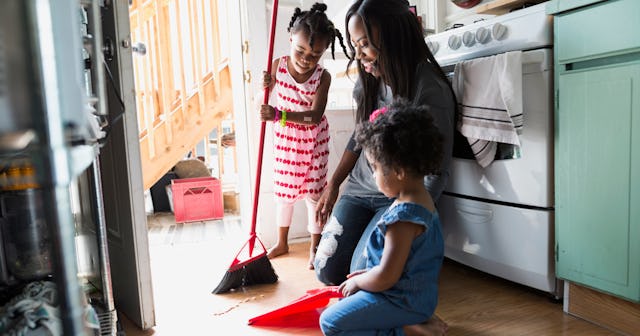Instead Of 'Try Harder,' I'm Teaching My Kids To Do This

My oldest son is six, so we are in that weird space between preschool and big kid. His problems are a little bigger than ever before, and I have to get more creative to think of a solution. Gone are the days when he wasn’t responsible for anything, and all he needed was for Mommy to kiss his boo-boos.
He’s in a new season of his life, and new seasons bring new responsibilities. I’m sure he would like me to do everything for him like I did when he was a toddler. Honestly, sometimes I wish I could do that, too. It would be more efficient for me to do everything myself than constantly remind him to do the things he’s supposed to.
Thankfully, I have the benefit of over three decades of life experience, and I know that doing everything for him won’t allow him to grow. He is learning how to be a good citizen of our home, and a productive member of our family. Eventually this will prepare him to be a good citizen of this planet, and a productive member of society.
Allowing him to navigate his new responsibilities at his own pace, while also teaching him to make good choices with his time and energy, is one of the hardest things I’ve done as a mom so far. I want to give him space to grow, but he needs to gently start learning that the world won’t always wait for him. Following directions, meeting deadlines, and overseeing the cleanliness of your own space are skills vital to his success as an adult.
Hoxton/Sam Edwards/Getty
We home school, so these lessons fall squarely on my shoulders. My son isn’t at school learning to keep a schedule. He isn’t facing natural consequences of poor social and time-management decisions the way his peers are. He isn’t in healthy competition with the kids next to him to keep him on pace. This is all on me, so I think about it a lot.
I have found that when Henry is off-pace, taking way too long to complete a task, losing his way in the middle or just generally stumbling, his go-to response when I call him out is to promise he will try harder. I give him encouragement, letting him know I believe if he does “try harder,” he can succeed.
But my little pep talk isn’t usually all that successful, if I’m being honest.
The whole idea of “try harder” is hard for some kids. At best, it’s broad and kind of useless. Sure, the idea of giving more effort sounds great, but how does a 6-year-old child really make that happen on his own? And what does “try harder” even mean?
At best, “try harder” is confusing and vague. At worst, “try harder” tells a struggling child that the reason they aren’t succeeding is because they aren’t giving enough of themselves. So instead of this default phrase, I’m encouraging my children to be comfortable saying something else.
“I could use some help.”
Images By Tang Ming Tung/Getty
Recently, Henry was attempting to clean his bedroom. It was taking the entire afternoon. We were both nearing the ends of our ropes. He kept promising to really, truly start doing his best, but his room wasn’t getting any cleaner. Trying harder wasn’t going to work.
The situation had escaped his control, and his young mind was just too overwhelmed to rescue himself. He needed a new strategy.
I walked into his room and calmly said, “You have been trying for hours to clean this room, and it’s not happening. I believe that you have tried your best, and you’re still having a hard time. Sometimes, the best thing you can do in a time like this is ask someone to help you get back on course. If you will think of some things that I can do that will be helpful to you, let me know, and I will help you.”
I didn’t walk in and start barking orders. I made him pinpoint the exact tasks that he would like me to do, leaving him in charge of the process and allowing me to assist rather than take ownership of the situation. He maintained his sense of pride and accomplishment, and he learned a lesson on leading and delegating.
In this instance, I believe offering to help taught him more about responsibility than making him do it alone.
A lot of parenting is teaching our children how to make good choices. What choice could be better than recognizing your own areas of weakness and asking someone who is better qualified for assistance? That kind of awareness is a skill many adults lack. Many of us have been so conditioned to depend on our own effort, that we would rather suffer than admit that we can’t do everything alone.
As my children get older, I will step in with less frequency. I won’t help them pick up toys and do simple subtraction forever. But I will always encourage them to ask for help. I think it’s a sign of strength to admit you need a little support. And similarly, I will ask how I can help.
When my kids hit a bump in the road, I don’t want them to rely solely on their own efforts, especially when they begin to flounder. I want them to understand that sometimes the best choice they can make is to trust that the people around them are vast sources of knowledge and wisdom, and let them help.
We can accomplish more together than we ever can apart, and that’s a lesson I want my kids to learn from the start.
This article was originally published on